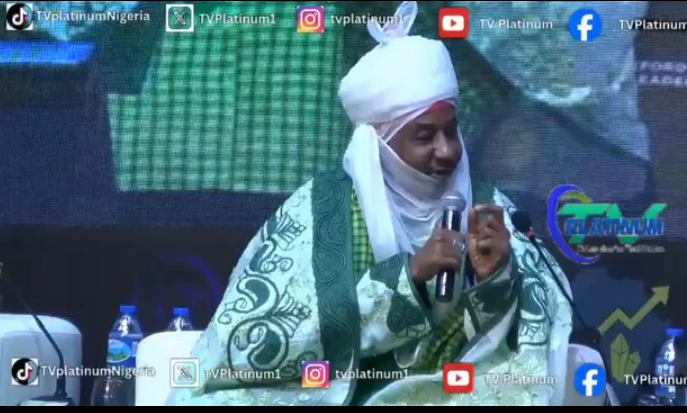
“Educated Illiterates in Power”: Emir Sanusi Blasts Nigerian Politicians for Turning Governance Into Praise Singing

In what many Nigerians are calling one of the most brutally honest statements from a public figure in recent times, the Emir of Kano, Alhaji Muhammadu Sanusi II, has once again sparked national conversation with his scathing remarks about the quality of leadership in the country. Speaking at a recent public event, the outspoken monarch described Nigeria as “a classless society where highly educated people in government behave like illiterates and turn to praise singers,” a statement that has since gone viral and reignited debates about the integrity and intellectual character of the political class.
Sanusi, who is known for his unfiltered criticism of Nigeria’s ruling elite, did not mince words in lamenting how the nation’s political leadership has degenerated into a system where sycophancy thrives over substance, and where education, integrity, and competence have little bearing on performance in public service. According to him, Nigeria’s biggest tragedy is not the absence of educated people in power but rather the presence of educated people who have abandoned reason, conscience, and morality for temporary political comfort. “We have professors, lawyers, and PhD holders in positions of power, yet they act as if they never saw the four walls of a school,” the Emir remarked. “They behave like illiterates, clapping and dancing for people who have destroyed the very institutions they swore to protect.”
His comments have sent ripples through social and political circles, drawing both applause and criticism. Many Nigerians on social media hailed Sanusi for once again speaking truth to power, describing his words as a reflection of what ordinary citizens have long felt but rarely dared to express publicly. Others, however, accused him of hypocrisy, pointing out that traditional rulers also benefit from the same system they criticize. Still, the overwhelming reaction has been one of agreement, with citizens expressing frustration at how governance in Nigeria has turned into a stage for theatrics rather than meaningful leadership.
Sanusi, a former Central Bank Governor and one of Nigeria’s most educated traditional rulers, has built a reputation for being fearless in his critique of the political elite. His latest outburst appears to be a continuation of his long-standing crusade against bad governance, corruption, and the failure of leadership to deliver on the promises of democracy. He noted that the erosion of values in Nigerian politics has created a nation where truth is punished, mediocrity is rewarded, and silence is considered safer than honesty. “We have created a culture where people who speak the truth are seen as enemies of progress, and those who lie to please the powerful are celebrated,” he said pointedly.
Observers say Sanusi’s comments carry significant weight, not only because of his position but also because of his intellectual pedigree. As one of the few traditional leaders with both global exposure and a deep understanding of Nigeria’s socio-economic structure, his words often echo beyond the walls of the palace. His critique reflects a broader sentiment shared by millions of Nigerians who believe that education and enlightenment have not translated into wisdom or good governance among the country’s elite.
In his speech, the Emir lamented how Nigeria’s educated class has failed to rise above ethnic and political loyalty to defend truth and justice. He accused many of them of abandoning their moral compass to chase appointments, contracts, or political favor. “The tragedy of Nigeria is not that we have uneducated leaders, but that we have educated people who refuse to use their education for the good of society. They become praise singers to survive,” he declared. He described this as the ultimate betrayal of education itself — a scenario where intellectuals become accomplices to corruption and injustice rather than the conscience of the nation.
The Emir’s words strike particularly hard at a time when Nigerians are grappling with deep economic hardship, a failing education system, and a growing sense of hopelessness about the political future. The naira continues to slide, unemployment remains high, and the cost of living has risen dramatically. Against this backdrop, Sanusi’s message resonates as both a wake-up call and a condemnation of a leadership class that seems disconnected from the people’s suffering. Many Nigerians see the political elite as living in luxury while ordinary citizens struggle to survive. “How can people who studied in the best universities turn around to destroy the systems they were supposed to reform?” he asked rhetorically.
The Emir’s statement also touched on the culture of blind loyalty that has taken root across Nigeria’s political landscape. He criticized the growing trend where politicians are surrounded by aides, supporters, and even intellectuals who are too afraid to speak the truth. “You see them singing praises of leaders who are clearly failing the people. They defend the indefensible, justify the unjustifiable, and promote lies in the name of loyalty,” Sanusi said, adding that such behavior has turned governance into a circus of sycophancy.
As expected, reactions from the political class have been mixed. While some quietly acknowledged the truth in Sanusi’s remarks, others dismissed them as unnecessary grandstanding. A senior political aide who requested anonymity said, “The Emir talks like he is not part of the system, but he knows how politics works in this country. Everyone has to play the game.” Yet this very attitude, critics argue, is exactly what Sanusi was condemning — the normalization of moral compromise in the name of survival.
For many Nigerians, Sanusi’s voice has become a rare source of truth in a society where leaders often prefer flattery over facts. His words cut through the noise and expose the intellectual bankruptcy that has plagued Nigeria’s leadership for decades. This is not the first time he has made such remarks; his past speeches have often challenged both political and religious establishments to embrace accountability and foresight. In 2013, as CBN Governor, he famously exposed the alleged disappearance of billions in oil revenue, a revelation that earned him both admiration and enemies.
This latest outburst continues that legacy. It is a reminder that Nigeria’s problem is not the lack of educated people in power, but the failure of those people to act with courage and integrity. Education without ethics, Sanusi seems to argue, is as dangerous as ignorance itself. His statement, while controversial, reflects a truth that is hard to ignore: Nigeria’s intellectual elite have too often chosen comfort over conviction, status over substance, and silence over sincerity.
As the video clip of his remarks circulates widely on social media, Nigerians continue to share it with mixed emotions — admiration, frustration, and hope. For some, Sanusi’s words reignite the desire for a new generation of leaders who are guided not by fear or greed but by a genuine commitment to the public good. For others, it is just another reminder of how deeply entrenched Nigeria’s leadership problems are.
Still, one thing is clear — the Emir of Kano has once again forced the nation to look in the mirror. His words are not just a rebuke to the political elite but a challenge to every educated Nigerian who has chosen silence in the face of wrongdoing. “We can’t build a nation of progress with educated illiterates,” Sanusi warned, his voice both firm and weary. “Until we reclaim our sense of dignity, truth, and courage, Nigeria will continue to move in circles.”
In a country where truth often comes at a price, Sanusi’s voice remains a beacon — uncomfortable, defiant, and necessary.
“Nigeria Is a Classless Society Where You Have Highly Educated People In Government Who Behave Like Illiterates And Turn To Praise Singers.”-Emir Of Kano, Sanusi Blasts Nigerian Politician In Power. pic.twitter.com/lToN8BUSHf
— Somto Okonkwo (@General_Somto) October 29, 2025


